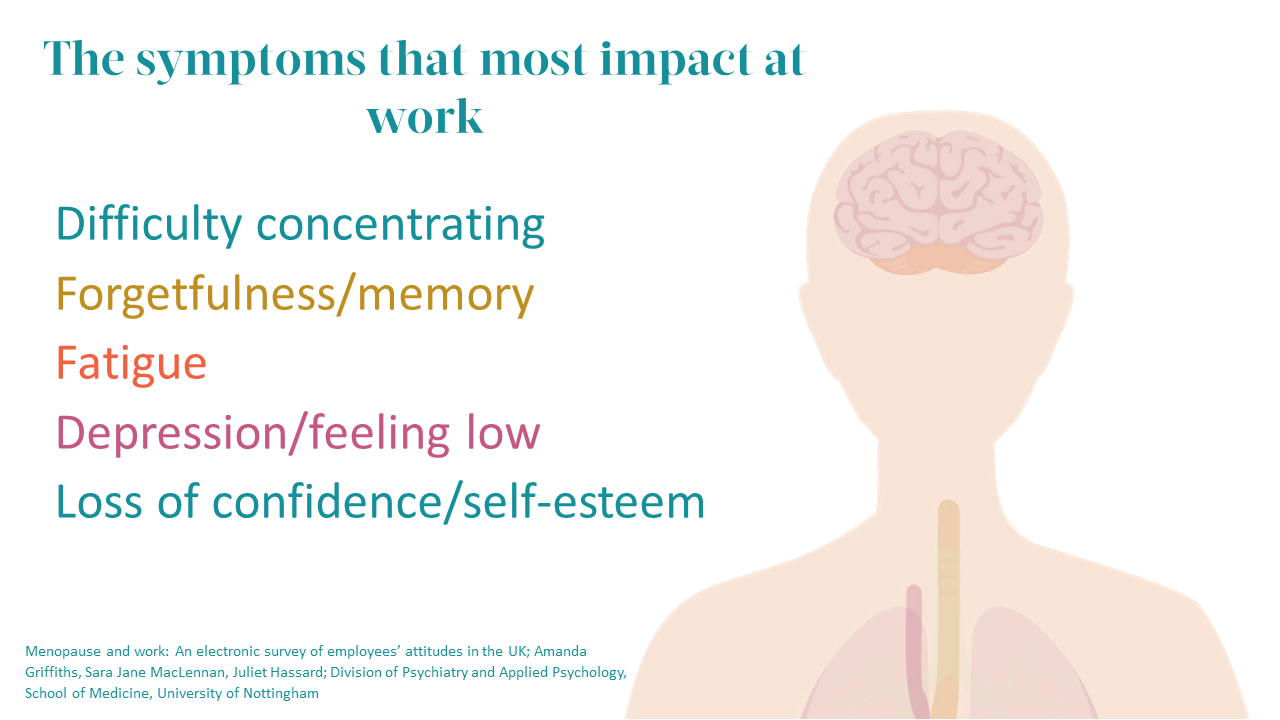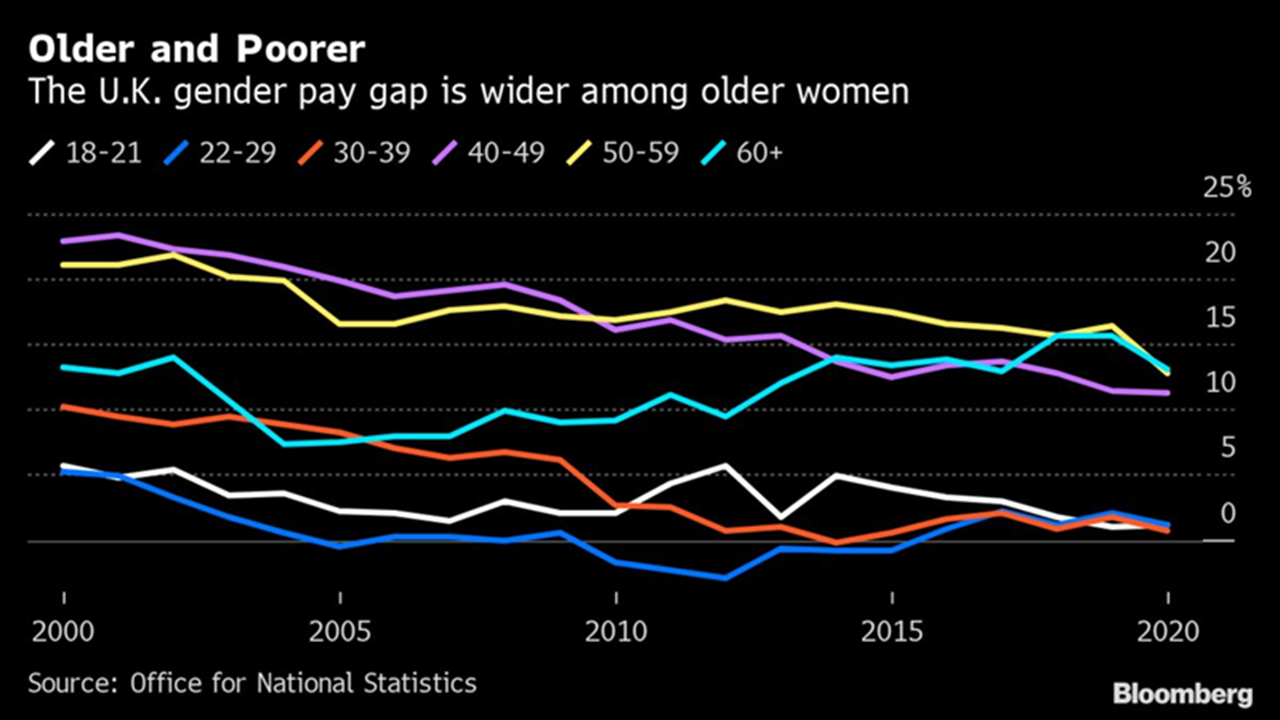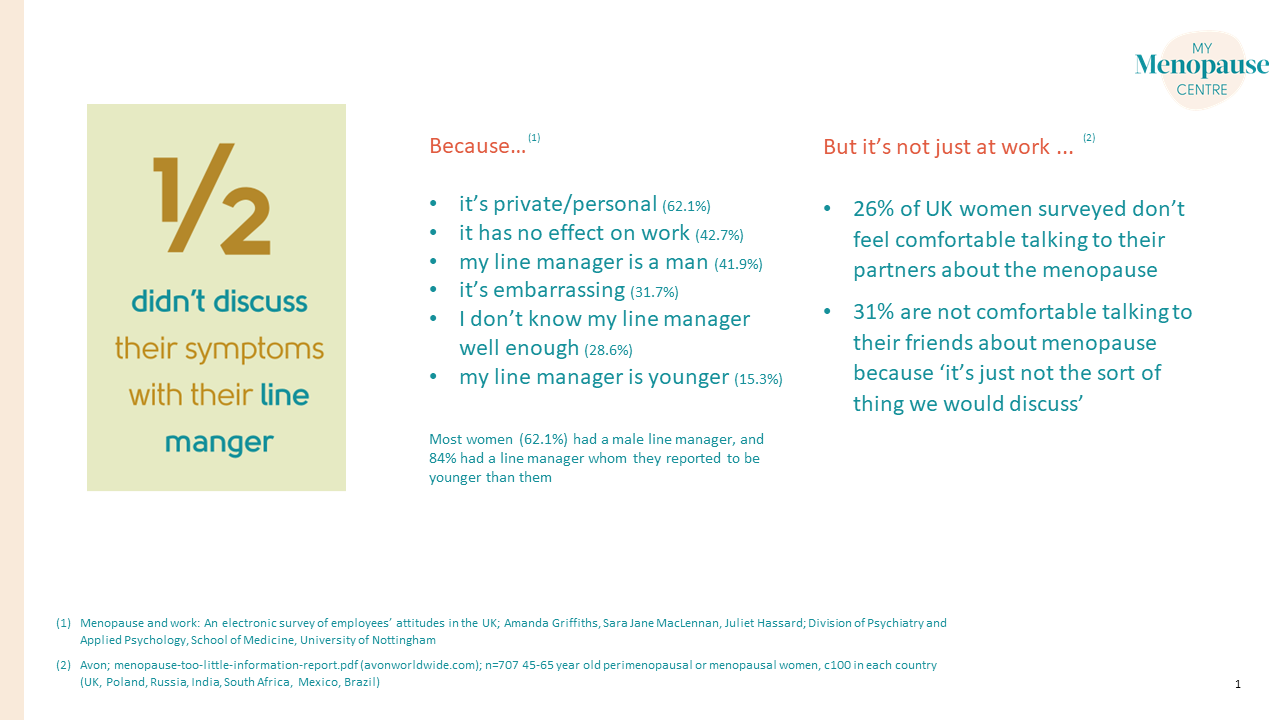Downloaded from www.mymenopausecentre.com
Direct URL: https://www.mymenopausecentre.com/blog/women-equalities-committee-menopause-workplace-inquiry/
Women and Equalities Committee Menopause and the Workplace Inquiry
We welcome the Women and Equalities Committee’s call for evidence to collect views on menopause and the workplace and are presenting an evidence-based submission that also draws on our professional and personal experiences. In April of this year, we commissioned BritainThinks to undertake qualitative and quantitative research with men and women across the UK to develop a holistic understanding of perceptions and experiences of the menopause. This work, alongside other published data, forms the basis of our submission. Our submission references the themes outlined in the submission guidance and provides an overview of our expertise in women’s health, specifically the menopause.
Who we are
My Menopause Centre was founded by Dr Clare Spencer (registered menopause specialist and GP) and Helen Normoyle, former Chief Marketing Officer of Boots UK and Ireland.
Dr Spencer qualified from Cambridge University and holds Membership of the Royal College of Obstetricians and Gynaecologists and Membership of the Royal College of General Practitioners. She initially trained in obstetrics and gynaecology where she gained a Doctor of Medicine for research in fetomaternal medicine. As well as her role of clinical director at My Menopause Centre, she is a practicing GP partner and registered menopause specialist in Meanwood, Leeds, where she treats a socially and culturally diverse patient population of 15,000. She single handedly set up and run a CCG (Clinical Commissioning Group) funded specialist menopause service from the Meanwood Group Practice since 2018. Patients are referred into this clinic from GPs and hospital consultant specialists, and Dr Spencer sees around 260 new referrals a year. This is also a culturally and socially diverse group of patients where the physical, mental and economic impact in
Dr Spencer wrote the menopause training module for doctors.net and has written for the Primary Care Women’s Health forum publication, Her Life Her Health, on a variety of menopause related topics.
My Menopause Centre is an online website that provides free, evidence-based information and advice on all stages of the menopause transition, 38 symptoms of the menopause, and an algorithmically driven questionnaire that provides a personalised menopause assessment. Led by Dr Spencer, My Menopause Centre also provides an online (private) menopause clinic, run by doctors who specialise in the treatment of the menopause.
Both Dr Spencer and Ms Normoyle are passionate about raising awareness of the menopause, the symptoms and the range of treatment options so that women thrive, and not just survive, through this stage of their lives. The benefits of this will be felt across the whole of society and not just the workplace.
What is the nature and extent of discrimination faced by women experiencing the menopause? How does this impact wider society?
The menopause is still a taboo
The menopause is a natural part of a woman’s life, and all women will experience it. Currently, there are an estimated 15.5m [2] women across the UK who are in some stage of the menopause transition.
Despite this, and despite the very welcome and much needed increase in public and national conversation about the menopause, our recent research shows the long-standing menopause taboo is still very much in place: 47% of the public agree it is a taboo topic in UK society – rising to 72% of perimenopausal and menopausal women[3]. As one of our participants explained:
“I don’t think we speak about it actually. Menopause is almost like a bad word. I don’t remember my mum or aunties talking about it. So no one ever knew enough.”
Low awareness of the menopause impacts women’s health
This taboo feeds directly into low awareness of the menopause as a women’s health issue, and low knowledge and understanding of this phase in women’s lives, including amongst women themselves.
While around 8 in 10 women will experience symptoms of the menopause…
- an average of 7 symptoms[4]
- with symptoms usually lasting 4 years, but can last for up to 12 years[5] and change over time
only one in four of the menopausal women we interviewed feel – or felt – prepared for the menopause, and over half underestimated the physical and mental/emotional symptoms.
In wider society, knowledge and understanding is even lower: 2 in 5 (43%) of the public agree they don’t know much about the menopause and just a third (33%) say that they would know how to support a woman who is going through the menopause.
This lack of knowledge, coupled with difficulties talking about menopause, has real-world impacts. Overall, without the right support and treatment, the symptoms of the menopause can have a negative impact on all aspects of a woman’s quality of life – home, work, social and sex life as research conducted by the British Menopause Society shows:

Ultimately, for some women, the cumulation of these challenges can lead to a loss of identity:
“It takes your confidence away. It took a lot of years out of my life when I wasn’t the same as I used to be.”
Menopause symptoms are impacting in the workplace
In research we conducted in the Spring with BritainThinks, over two thirds of the menopausal women we interviewed agreed that the symptoms of the menopause can have a negative impact on a woman’s performance and on her career.
This is playing out in the workplace – research by Bupa and the CIPID[6] has shown that almost one million women in the UK have left their jobs as a result of menopausal symptoms. That’s a staggering figure, given the organisational impact of this loss of talent and impacted productivity, and clearly illustrates the need for workplaces to do more to support women in this stage of their life.
Knowledge is power
Our research shows very clearly that the more prepared for the menopause a woman is, the better her experience of it will be. This underscores the importance of education and information in enabling women to feel empowered to talk about their health and the support they need – whether at home or at work – and shows that women who feel prepared for menopause have better outcomes.
- While only 1 in 4 women say they feel/felt prepared for the menopause, those who say they feel prepared are far more likely than other women to say that menopause can be a positive change in women’s lives (54% vs 26%) and less likely to say they feel/felt under pressure just to cope with the symptoms (24% vs 71%) and less likely to say they feel/felt more isolated from others as a result of the menopause (12% vs 44%).
This finding highlights the importance of building knowledge of the menopause amongst younger women so that they’re prepared for what’s to come. In our survey, over half (53%) of women aged 18 – 44 interviewed agree they ‘don’t really know much about the menopause’, compared to 20% of women aged 45 – 64.
The menopause is everyone’s business
But it’s not just women we need to focus on. This data also highlights the need to make the menopause everyone’s business by tackling the taboos around it and showing that it affects not ‘just’ the 50% of the population who experience it, but everyone around them… their families, friends, and employers.
Men – whether at home or at work – also have a key role to play. With 67% of the men surveyed agreeing that the menopause is not an issue which affects them personally, it’s clear there’s a real need to raise awareness of the menopause, the impact that symptoms can have and the best way to support those going through it too.
Workplaces clearly have a key role to play here, which will benefit not only them, but also society more widely.
What is the economic impact of menopause discrimination?
Symptoms have an impact at work – performance, engagement, retention
As mentioned above, around 8 in 10 women will experience symptoms of the menopause, and research has shown that the symptoms that can have the most impact at work are related to mood and cognitive function:

Multiple studies show the negative impact that the symptoms of the menopause can have on women’s workforce participation i.e., engagement, retention and performance. For many women, symptoms impact them when they are in senior roles and at the peak of their careers.
- On average, women missed 3.27[7] days of work each year due to their symptoms, with a potential productivity loss of c14m working days. Almost half the employed women who took time off because of the menopause (47%) would not tell their employer the real reason.
- Women aged 45-54 being the group most commonly report work related stress[8]
- Various research studies also suggest that, amongst those experiencing symptoms, for some women their symptoms are leading them to consider reducing their hours, leaving their jobs altogether or are the reason they have left their jobs[9]. This from one of the workplace managers interviewed in the BritainThinks research:
“One of my senior colleagues took a demotion as she was embarrassed, she made some mistakes, and I felt she didn’t feel like she could say, and it was just too much”
Workplace manager
The impact of the symptoms of the menopause contribute to the gender pay gap
This no doubt also contributes to the increase in the gender pay gap that we see for women in their 40s, 50s and 60s:

How can businesses factor in the needs of employees going through the menopause?
The menopause is still a taboo at work
Despite the increasing conversations about it, the menopause is still a taboo subject in the workplace, with around half of the menopausal women interviewed in one survey saying they didn’t discuss their symptoms with their line manager:

Too many women don’t feel supported at work
Women also do not feel supported at work (a survey by Nuffield Health found 72% of female workers suffering symptoms said they felt unsupported at work, even though 1 in 5 said their symptoms have a detrimental impact on their work[10]) and there is appetite for menopause policies and access to advice and support[11].
In My Menopause Centre’s work with BritainThinks, women interviewed were largely unaware of policies to support women through the menopause at work and were often uncomfortable discussing the issue with their line manager (especially if they were younger and/or a man) – meaning that they were left feeling that they “just have to cope”.
More support would, unsurprisingly, be welcomed. Nevertheless, there is a desire for support; in an Ipsos MORI survey[12], among the women interviewed whose employer did not offer any support:
- almost 4 in 10 (37%) would like their employers to offer access to specialist menopause advice from a third-party expert
- 31% would like their employer to offer a menopause policy
- 27% would like training/courses for line managers to address menopause awareness
- 19% would like a menopause support group
- 12% would like menopause workshops
How can practices addressing workplace discrimination relating to menopause be implemented?
What can organisations do to support women going through the menopause?
Developing and implementing a menopause policy is a great first step to ensuring that women are supported and not discriminated against because of the impact of their menopause symptoms. And as the above research demonstrates, it would be much welcomed.
Such a policy could include, for example:
- An overview of what the menopause is and the key symptoms – with information provided in a factual, straightforward, and engaging way to help educate all colleagues.
- An overview of the types of workplace support and adjustments that can be made to help women manage their symptoms – e.g., desk fans, cool/quiet rooms, flexible working, support from Occupational Health (for both the home and work environment), sickness and paid leave, medical support.
- Covering both the workplace and homeworking settings when looking at the adjustments that can be made.
- Tailoring content for supporting roles (HR, Occupational Health, line managers), for all employees and for employees going through the menopause
- Outline what training is available to line managers and colleagues, and what is expected of each.
- It’s important to train managers to be better equipped to support colleagues impacted by menopause symptoms, and in managing an age-diverse workforce
- Signpost relevant resources.
- Be clear what help and support is available and how to access it
- Take an ‘always-on’ approach to communications and engagement on this
However, while creating a menopause policy is incredibly helpful and provides a great foundation, in and of itself it’s not enough. Our research indicates that to be effective, policies and support needs to be championed from the very top of the workplace so that it becomes embedded in the organisation’s culture.
One workplace manager interviewed described the transformational effect the CEO talking about her experience had:
“They do drop-in sessions, and the CEO was really good and open about her situation and that encouraged other people to be open, and that opened up a lot of doors.”
Examples of best practice
The CIPD offers some great advice on what to include in a menopause policy, as does Menopause in the Workplace, who offer CPD accredited menopause training for organisations, and who have also recently launched a menopause accreditation for employers. Channel 4 has also made its menopause policy publicly available, as has the agency Dark Horses.

Book a consultation
Whether you want to discuss your symptoms, create a treatment plan that's right for you, understand some test results or have a check-up, the highly experienced doctors and nurses in our menopause clinic are here to help you.
Book nowReferences
-
BritainThinks is a global insight and strategy consultancy dedicated to putting the people that matter most to its clients at the heart of their thinking. BritainThinks works across issues and sectors, but has particular expertise in the healthcare space, where its clients include DHSC, NHS England, the Richmond Group of Charities, and the Cabinet Office.
-
Data based on ONS population estimates for the UK, England and Wales, Scotland and Northern Ireland: mid-2019, using April 2020 local authority district codes; all women aged 45-90+
-
BritainThinks conducted a nationally representative online quantitative study of 2,087 adults in the UK over the 30th April – 3rd May, and qualitative research with women with experience of the menopause, male partners and workplace managers
-
Menopause – Understanding the impact on women and their partners, Heather Currie, Sara J Moger ; (based on three online surveys with women 45+ with menopause symptoms (currently/in previous 10 years; 2015/n=1,000; 2016/ n=1,000; 2017/n=650 women and n=350 partners)
-
https://www.nhs.uk/conditions/menopause/symptoms/
-
Millions Of Women Exit Workforce For A Little-Talked About Reason (bloombergquint.com)
-
Menopause – Understanding the impact on women and their partners, Heather Currie, Sara J Moger ; (based on three online surveys with women 45+ with menopause symptoms (currently/in previous 10 years; 2015/n=1,000; 2016/ n=1,000; 2017/n=650 women and n=350 partners)
-
The effects of menopause transition on women’s economic participation in the UK Brewis, Davies, Matheson Joanna Brewis, Vanessa Beck, Andrea Davies and Jesse Matheson – University of Leicester, July 20172
-
https://www.ipsos.com/ipsos-mori/en-uk/world-menopause-day-2020
Ipsos MORI interviewed a sample of 846 working women and 250 working men aged 40-65 in the UK. Interviews were conducted via Ipsos MORI’s online panel between 1st-5th October 2020.
https://www.nuffieldhealth.com/article/one-in-four-with-menopause-symptoms-concerned-about-ability-to-cope-with-life; N = 3,275 women aged between 40 and 65. Results issued September 2017.
https://comresglobal.com/polls/bbc-menopause-survey/. ComRes interviewed 1,009 women aged 50-60, between 8th December and 18th December 2017. -
https://www.nuffieldhealth.com/article/one-in-four-with-menopause-symptoms-concerned-about-ability-to-cope-with-life; N = 3,275 women aged between 40 and 65. Results issued September 2017.
-
https://www.ipsos.com/ipsos-mori/en-uk/world-menopause-day-2020
Ipsos MORI interviewed a sample of 846 working women and 250 working men aged 40-65 in the UK. Interviews were conducted via Ipsos MORI’s online panel between 1st-5th October 2020. -
https://www.ipsos.com/ipsos-mori/en-uk/world-menopause-day-2020
Ipsos MORI interviewed a sample of 846 working women and 250 working men aged 40-65 in the UK. Interviews were conducted via Ipsos MORI’s online panel between 1st-5th October 2020.
Contact My Menopause Centre
- General enquiries: hello@mymenopausecentre.com
- Book appointments online: Log into your account and go to 'My appointments'
- Book appointments by phone: 0333 444 1067
- Website: https://www.mymenopausecentre.com



















We’d love to hear from you
Please ensure you’re logged in to leave a comment. Not got an account – registration is quick and easy! All comments are moderated prior to being posted on the website and are subject to our Acceptable Use Policy.
Comments